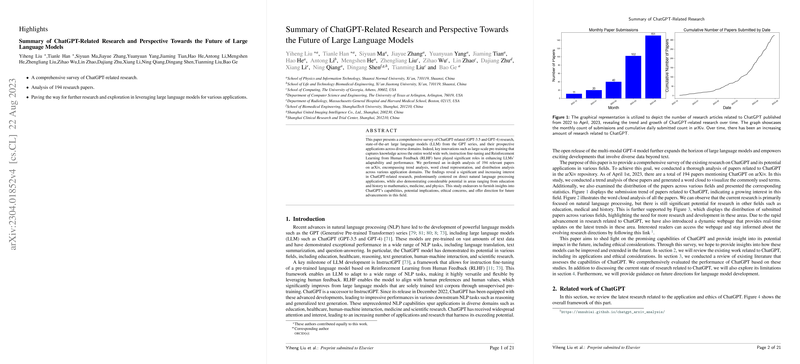Overview of ChatGPT-Related Research and Future Perspectives for LLMs
This paper presents a comprehensive survey of research related to ChatGPT, particularly focusing on the developments of GPT-3.5 and GPT-4, alongside other significant LLMs from the GPT series. By examining 194 relevant papers from the arXiv repository, the paper provides an extensive analysis of trends, key topics, and the diverse application domains of ChatGPT.
The paper underscores several innovations that have markedly improved LLMs' adaptability and performance, including extensive pre-training on data from the World Wide Web, reinforcement learning from human feedback (RLHF), and instruction fine-tuning. These innovations have enabled ChatGPT to excel across an array of NLP tasks such as language translation, text summarization, question-answering, and more. ChatGPT has demonstrated significant versatility and has been investigated or applied in fields as varied as education, mathematics, medicine, physics, and human-machine interaction.
Numerical Analysis and Results
The paper's analysis reveals a marked interest in ChatGPT-related research, with a substantial increase in the number of research articles published over time—signifying growing academic and practical interest. The authors' word cloud visualizations provide a synoptic illustration of key terms and concepts, predominantly centered around NLP. However, the paper posits that while substantial research has focused on NLP applications, there is potential for more exhaustive exploration in areas such as education, healthcare, and historical analysis.
Implications and Speculative Future Directions
Practically, ChatGPT's capabilities in automating and generating human-like text have transformative implications across multiple domains, potentially shifting paradigms in how tasks such as document summarization and knowledge extraction are accomplished. Theoretically, the advances in LLMs, exemplified by ChatGPT, hint at an evolving trajectory towards artificial general intelligence (AGI), with ongoing advancements in context-awareness, seamless human-robot interaction, and real-time data synchronization shaping the future of AI research and applications.
Future research directions could include real-time data integration to keep LLMs updated with current information, improvements in context comprehension, particularly in the understanding of ambiguous or domain-specific contexts, and a heightened focus on creating ethical and legally compliant AI frameworks. Furthermore, enhancing the domain-specific applicability of these models and addressing inherent biases in the data they are trained on will be crucial for their responsible deployment in sensitive fields such as healthcare and public policy formulation.
Ethical Considerations
The paper also highlights significant ethical concerns associated with the deployment of LLMs like ChatGPT. The potential for generating biased or politically skewed content, privacy infractions, and the misuse of these technologies commands dedicated attention and the formulation of clear guidelines for ethical model usage and development. Addressing these ethical challenges will be fundamental in ensuring the responsible adoption of LLMs in practical applications.
In conclusion, this survey illustrates the expansive potential of ChatGPT, from advancing current NLP applications to catalyzing new ones, while also emphasizing the necessity for continued research into ethical model training and application. As the domain progresses, this examination serves as a cornerstone for ongoing and future explorations in leveraging LLMs effectively across diverse interdisciplinary fields.
